C#与C++互操作
一、C#调用C++库
1、创建C++库
打开VisualStudio,创建一个C++工程,输入项目名称HelloWorldLib

确定,然后下一步。选择应用程序类型为DLL
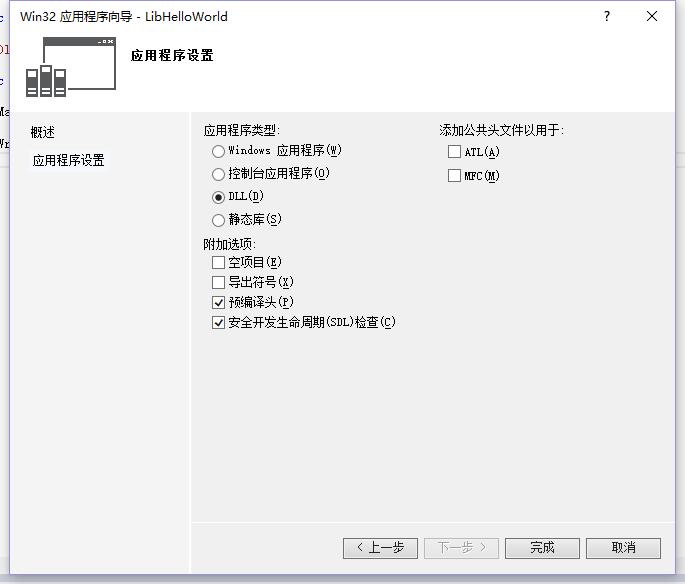
单击完成,我们就创建好了一个C++库的项目。
这里为了方便,我们直接在HelloWorldLib.cpp里定义函数
C++库导出有两种方式
一、以C语言接口的方式导出
这种方法就是在函数前面加上 extern "C" __declspec(dllexport)
加上extern "C"后,会指示编译器这部分代码按C语言的进行编译,而不是C++的。
1 #include "stdafx.h" 2 #include<iostream> 3 4 extern "C" __declspec(dllexport) void HelloWorld(char* name); 5 6 7 extern "C" __declspec(dllexport) void HelloWorld(char* name) 8 { 9 std::cout << "Hello World " << name << std::endl; 10 }
二、以模块定义文件的方式导出
在工程上右键,选择添加-》新建项
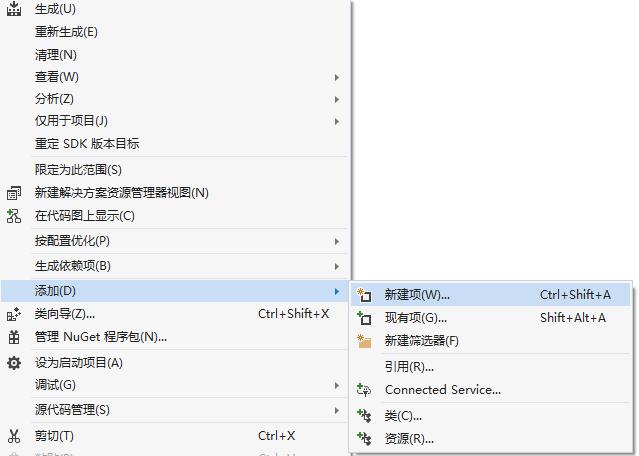
然后选择代码-》模块定义文件

在Source.def中输入
LIBRARY
EXPORTS
HelloWorld
EXPORTS下面就是要导出的函数,这里不需要添加分号隔开,直接换行就行。
此时,我们函数的定义如下
1 #include "stdafx.h" 2 #include<iostream> 3 4 void HelloWorld(char* name); 5 6 7 void HelloWorld(char* name) 8 { 9 std::cout <<"Hello World "<< name << std::endl; 10 }
编译,生成dll。这里需要注意的是,如果生成是64位的库,C#程序也要是64位的,否则会报错。
2、使用C#调用
接下来我们新建一个C#控制台项目
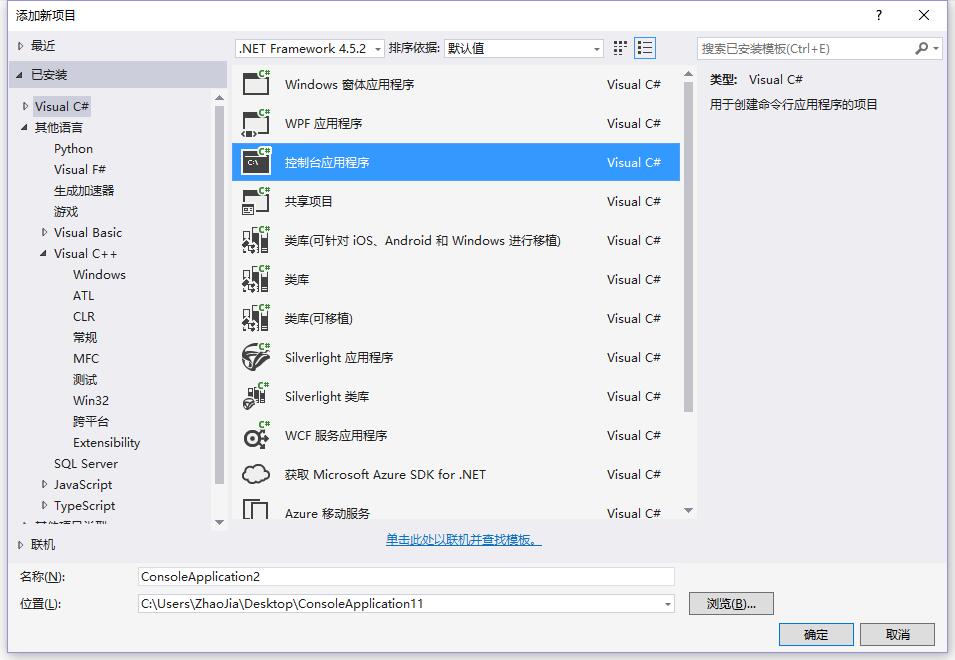
打开前面C++库生成的目录,将HelloWorldLib.dll复制到C#工程的Debug目录下。也可以不复制,只需在引用dll的时候写上完整路径就行了。这里我是直接复制到Debug目录下
1 using System.Runtime.InteropServices; 2 3 namespace ConsoleApplication2 4 { 5 class Program 6 { 7 [DllImport("HelloWorldLib.dll")] 8 public static extern void HelloWorld(string name); 9 10 //可以通过EntryPoint特性指定函数入口,然后为函数定义别名 11 12 [DllImport("HelloWorldLib.dll", EntryPoint = "HelloWorld")] 13 public static extern void CustomName(string name); 14 static void Main(string[] args) 15 { 16 HelloWorld("LiLi"); 17 //跟上面是一样的 18 CustomName("QiQi"); 19 } 20 } 21 }
运行程序,结果如下:

这样就成功创建了一个C#可以调用的C++库
下面我们动态调用C++库,这里委托的作用就比较明显了。把委托比喻为C++的函数指针,一点也不为过。
我们在C++库中再新增一个函数GetYear(),用来获取当前年份。
1 int GetYear(); 2 3 int GetYear() 4 { 5 SYSTEMTIME tm; 6 GetLocalTime(&tm); 7 8 return tm.wYear; 9 }
记得在导出文件中(Source.def)增加GetYear。编译,生成新的DLL
再新建一个C#控制台程序
代码如下:
1 using System; 2 using System.Runtime.InteropServices; 3 4 namespace ConsoleApplication3 5 { 6 7 class Program 8 { 9 [DllImport("kernel32.dll")] 10 public static extern IntPtr LoadLibrary(string lpFileName); 11 12 [DllImport("kernel32.dll")] 13 public static extern IntPtr GetProcAddress(IntPtr hModule, string lpProcName); 14 15 [DllImport("kernel32", EntryPoint = "FreeLibrary", SetLastError = true)] 16 public static extern bool FreeLibrary(IntPtr hModule); 17 18 //声明委托,这里的签名,需要跟C++库中的对应 19 delegate int GetYearDelegate(); 20 21 static void Main(string[] args) 22 { 23 GetYearDelegate m_fGetYear; 24 IntPtr hModule = LoadLibrary("HelloWorldLib.dll"); 25 if(hModule != IntPtr.Zero) 26 { 27 IntPtr hProc = GetProcAddress(hModule, "GetYear"); 28 if(hProc != IntPtr.Zero) 29 { 30 m_fGetYear = (GetYearDelegate)Marshal.GetDelegateForFunctionPointer(hProc, typeof(GetYearDelegate)); 31 32 //在这里可以调用 33 int year = m_fGetYear(); 34 Console.WriteLine("年份是:" + year); 35 } 36 } 37 } 38 } 39 }
运行结果:

好的,前面函数里面涉及的都是简单数据类型,下面来介绍一下复杂数据类型。这里指的是结构体
在C++库中定义一个GetDate()的函数,代码如下。这里也要记得在导出文件中添加(Source.def)
struct MyDate { int year; int month; int day; }; MyDate GetDate(); MyDate GetDate() { SYSTEMTIME tm; GetLocalTime(&tm); MyDate md; md.day = tm.wDay; md.month = tm.wMonth; md.year = tm.wYear; return md; }
新建一个C#控制台程序,完整代码如下
1 using System; 2 using System.Runtime.InteropServices; 3 4 namespace ConsoleApplication3 5 { 6 struct MyDate 7 { 8 public int Year; 9 public int Month; 10 public int Day; 11 } 12 13 14 class Program 15 { 16 [DllImport("kernel32.dll")] 17 public static extern IntPtr LoadLibrary(string lpFileName); 18 19 [DllImport("kernel32.dll")] 20 public static extern IntPtr GetProcAddress(IntPtr hModule, string lpProcName); 21 22 [DllImport("kernel32", EntryPoint = "FreeLibrary", SetLastError = true)] 23 public static extern bool FreeLibrary(IntPtr hModule); 24 25 delegate IntPtr GetDateDelegate(); 26 27 static void Main(string[] args) 28 { 29 GetDateDelegate m_fGetDate; 30 IntPtr hModule = LoadLibrary("HelloWorldLib.dll"); 31 32 if (hModule != IntPtr.Zero) 33 { 34 IntPtr hProc = GetProcAddress(hModule, "GetDate"); 35 if (hProc != IntPtr.Zero) 36 { 37 m_fGetDate = (GetDateDelegate)Marshal.GetDelegateForFunctionPointer(hProc, typeof(GetDateDelegate)); 38 IntPtr ptr = m_fGetDate(); 39 if(ptr != IntPtr.Zero) 40 { 41 MyDate md = (MyDate)Marshal.PtrToStructure(ptr, typeof(MyDate)); 42 Console.WriteLine("{0}年-{1}月-{2}日",md.Year,md.Month,md.Day); 43 } 44 } 45 } 46 } 47 } 48 }
运行结果如下:

C#与C++互操作,很重要的一个地方就是,要注意数据类型的对应。有时还需要加上一些限制,
关于C#与C++数据类型对应
可以参考以下链接:
https://www.cnblogs.com/zjoch/p/5999335.html
大部分硬件厂商提供的SDK都是需要C++来调用的,有了上面的知识,使用C#来调用一些硬件的SDK就比较容易了。只需要使用C++再进行一次封装就行了。
二、C++调用C#库
这里用到是C++/CLI,就是如何用C++在·NET中编程。就是因为有这个东西的存在,C++才能调用C#的库
下面新建一个C#类库CSharpLib

这里我们使用C#封装一个读取XML节点的函数(仅供演示)
先创建一个XML文件,并保存为Student.xml
1 <?xml version="1.0" encoding="UTF-8" standalone="yes"?> 2 <Student> 3 <Name>自由在高处</Name> 4 <Age>17</Age> 5 <Size>40</Size> 6 </Student>
在CSharpLib工程中创建一个XmlQuery类(包含XPathQuery和GetFirstStudent两个成员函数)和一个Student结构体,代码如下:
1 public class XmlQuery 2 { 3 private string fileName; 4 private XDocument doc; 5 6 public XmlQuery(string fileName) 7 { 8 this.fileName = fileName; 9 doc = XDocument.Load(fileName); 10 } 11 12 public XmlQuery() 13 { 14 15 } 16 17 public string XPathQuery(string xPath) 18 { 19 if (doc == null) 20 return ""; 21 22 var result = doc.XPathSelectElement(xPath); 23 24 if (result == null) 25 return ""; 26 27 return result.Value; 28 } 29 30 public Student GetFirstStudent() 31 { 32 if (doc == null) 33 return new Student(); 34 35 var root = doc.Root; 36 37 Student student = new Student(); 38 student.Name = root.Element("Name").Value; 39 student.Age = Convert.ToInt32( root.Element("Age").Value); 40 student.Size = Convert.ToInt32(root.Element("Size").Value); 41 42 return student; 43 } 44 } 45 46 public struct Student 47 { 48 /// <summary> 49 /// 需要限定长度,否则会转换失败 50 /// </summary> 51 [MarshalAs(UnmanagedType.ByValTStr, SizeConst = 256)] 52 public string Name; 53 54 /// <summary> 55 /// 基本数据类型注意封送时对应的类型即可 56 /// </summary> 57 public int Age; 58 59 public int Size; 60 }
然后我们创建一个C++控制台程序UseCSharpLib
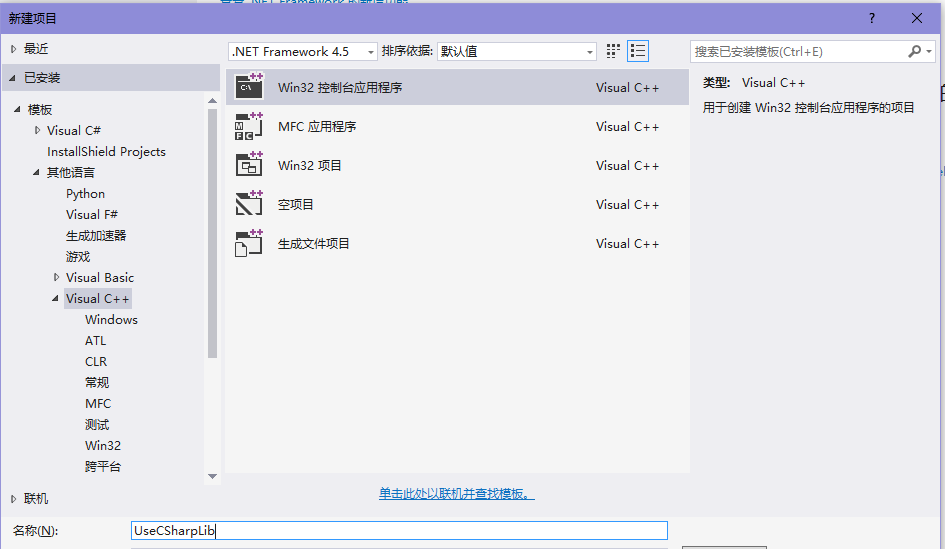
创建完成后,将前面编译的CSharpLib.dll和Student.xml拷贝到编译目录下和代码目录下

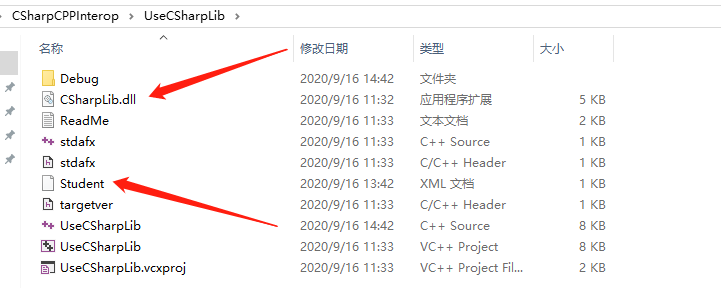
然后到属性页里开启公共语言运行时支持
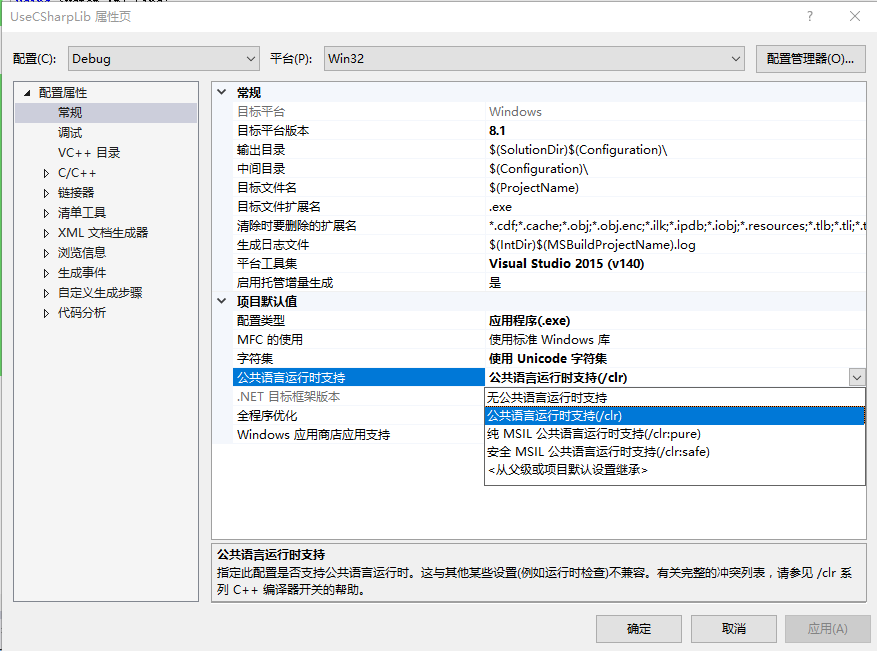
使用#using引用前面编译并复制到代码目录下的C#库。这里的相对路径是相对代码工程文件所在的位置
1 #using "CSharpLib.dll"
包含必要的头文件及引入命名空间
1 #include<msclr\marshal_cppstd.h> 2 3 using namespace System; 4 using namespace msclr::interop; 5 using namespace std; 6 using namespace CSharpLib;
使用gcnew实例化对象,并调用XmlQuery类的成员函数XPathQuery:
1 XmlQuery^ query = gcnew XmlQuery("Student.xml"); 2 System::String ^str = query->XPathQuery("Student/Name");
XPathQuery函数返回类型是System.String类型,可以直接使用.Net中String类提供的功能,也可以转换成char*来进行下一步的操作
1 //直接使用System.String类中的属性和函数 2 System::Console::WriteLine(str); 3 System::Console::WriteLine(str->Length); 4 5 //将System.String转换成char* 6 System::IntPtr ptr = System::Runtime::InteropServices::Marshal::StringToHGlobalAnsi(str); 7 char* chData = (char *)(void *)ptr; 8 9 cout << chData << endl; 10 cout << strlen(chData) << endl; 11 12 //释放内存 13 System::Runtime::InteropServices::Marshal::FreeHGlobal(ptr);
运行结果如下:

GetFirstStudent函数返回了一个Student结构体,下面的代码演示了调用该函数后,将返回值转换为C++中的结构体。
首先在C++中定义一个结构体:
1 struct StudentCPP 2 { 3 char Name[256]; //大小要跟C#中的保持一致 4 int Age; 5 int Size; 6 };
调用GetFirstStudent
1 CSharpLib::Student stu = query->GetFirstStudent(); 2 3 //可以直接操作stu 4 int age = stu.Age; 5 System::String^ name = stu.Name; 6 int size = stu.Size; 7 8 //也可以转换为C++中的结构体 9 System::IntPtr stuPtr = System::Runtime::InteropServices::Marshal::AllocHGlobal(System::Runtime::InteropServices::Marshal::SizeOf(stu)); 10 System::Runtime::InteropServices::Marshal::StructureToPtr(stu, stuPtr,true); 11 StudentCPP* student = (StudentCPP*)(void*)stuPtr; 12 13 cout << "Name: " << student->Name << endl 14 << "Age: " << student->Age << endl 15 << "Size: " << student->Size << endl; 16 17 //释放内存 18 System::Runtime::InteropServices::Marshal::FreeHGlobal(stuPtr);
运行如果如下:

说明:
1、需要注意C#和C++在进行互操作时的数据类型对应 。可以参考以下链接
https://www.cnblogs.com/zhaotianff/p/12896297.html
2、C#中的类和结构体可以转换成C++中的结构体,但要注意一些原则,可以参考以下链接
https://www.cnblogs.com/zhaotianff/p/12510286.html
https://www.cnblogs.com/zhaotianff/p/13300438.html
3、暂时只想到这两点
最后再附上示例代码,玩得愉快。
时隔两年才更新在C++中调用C#库,我也是醉了啊




